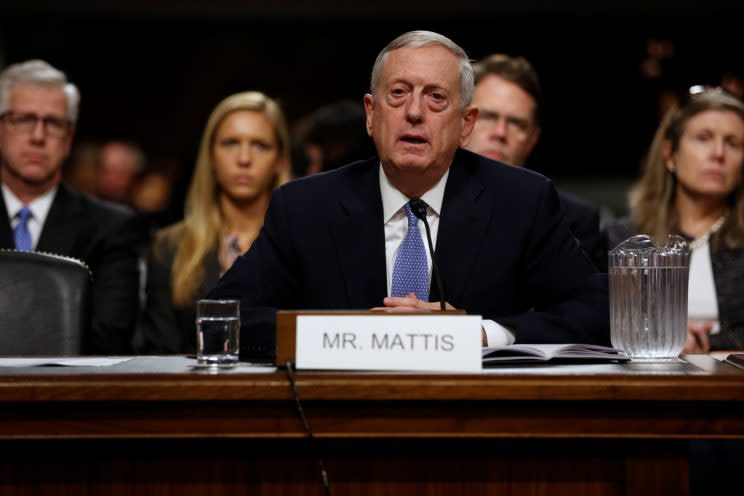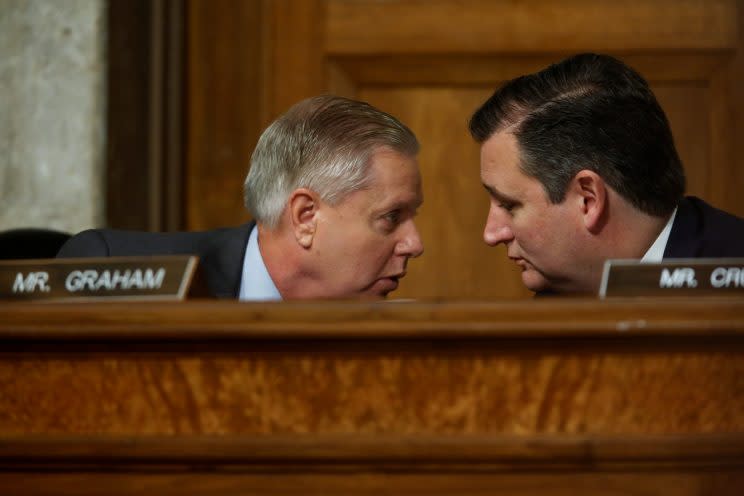Defense secretary pick Mattis calls Russia top threat, says Iran deal will be enforced
Defense secretary nominee James Mattis on Thursday ranked Russia and the national debt as top threats to U.S. national security and said that President Obama’s nuclear deal with Iran was “imperfect” but must be enforced.
“It’s not a deal I would have signed,” the retired Marine general said in a wide-ranging Senate Armed Services Committee hearing focused on his virtually certain confirmation. “But when America gives her word, we have to live up to it and work with our allies.”
During a three-hour appearance before lawmakers who rarely challenged him, Mattis repeatedly criticized Russia, promised that President-elect Donald Trump would enforce NATO’s automatic mutual-defense agreement, and said he had no plans to roll back the role of women or LGBTQ Americans in the military. He also put some distance between himself and his frequently cited nickname, “Mad Dog.” which he is known to loathe if it is used by people other than the Marines who served under him in combat.
“I assure you that nickname was given to me by the press, and some of you may have experienced similar occasions with the press where perhaps they did not get it quite right,” Mattis said, to approving chuckles from his audience.
Trump himself has frequently used the moniker.
General James "Mad Dog" Mattis, who is being considered for Secretary of Defense, was very impressive yesterday. A true General's General!
— Donald J. Trump (@realDonaldTrump) November 20, 2016
Moments after the hearing, the committee voted 24-3 to approve legislation that would waive a U.S. law requiring that a nominee wait seven years between leaving the military and serving as defense secretary. Mattis, 66, retired in 2013 after a stint as the head of the U.S. Central Command, which has responsibility for Afghanistan and Iraq as well as Iran, Syria and Yemen. The full Senate and House of Representatives are on track to approve the waiver, and the Senate is expected to move swiftly to confirm him by an overwhelming margin.
Prodded by Sen. John McCain, R-Ariz., the chairman of the committee, to describe his view of relations with Moscow, Mattis spoke bluntly about Russian President Vladimir Putin.
“I think right now the most important thing is that we recognize the reality of what we deal with [in] Mr. Putin, and we recognize that he is trying to break the North Atlantic alliance and that we take the steps — the integrated steps, diplomatic, economic, military and the alliance steps, working with our allies to defend ourselves where we must,” he said.
Russia has chosen to be “an adversary in key areas,” Mattis said later in the hearing. “I’m all for engagement, but we also have to recognize reality and what Russia is up to, and there’s decreasing number of areas where we can engage cooperatively and increasing number of areas where we’re going to have to confront Russia.”

Asked by Sen. Martin Heinrich, D-N.M., to rank the greatest threats to U.S. national security, Mattis replied: “I would consider the principal threats to start with Russia.”
Amid Trump’s very public feud with U.S. intelligence agencies over their assessment of Russian cyberattacks, Sen. Jack Reed, R.I., the panel’s top Democrat, asked Mattis what he would do if he became aware of someone “disrupting the intelligence community, disparaging it, undermining it, ignoring it.” Mattis said Trump would listen to him.
“I can tell you that in my many years of involvement in the military, I had a close relationship with the intelligence community. I could evaluate their effectiveness at times on a daily basis, and I have very, very high degree of confidence in our intelligence community,” he told Reed.

Sen. Kirsten Gillibrand, D-N.Y., pressed Mattis to explain his position toward opening combat roles to women and LGBTQ Americans, citing an essay in a book that the retired general recently co-edited, in which the author expresses his concerns.
“Unless a service chief brings something to me where there has been a problem that has been proven, then I’m not going in with the idea that I am going to review these and right away start rolling something back,” he said.
Mattis told Reed that the United States had a strategy for taking on the so-called Islamic State and taking the city of Raqqa, which the group claims as its capital. However, Mattis said, “I believe that strategy needs to be reviewed and perhaps energized on a more aggressive timeline.”
In an exchange with Sen. Lindsey Graham, R-S.C., Mattis declined to say that Jerusalem was Israel’s capital, or to endorse moving the U.S. embassy to that city from Tel Aviv. During the campaign, Trump called for moving the embassy “to the eternal capital of the Jewish people, Jerusalem.”
Asked by Sen. Mazie Hirono, D-Hawaii, about the complaints Trump has expressed on Twitter about the cost of military contracts with prominent companies like Boeing, Mattis lined up behind the future commander in chief.
“It’s not my role to comment on the president-elect’s statements, other than to say I believe it shows he is serious about getting the best bang for the dollar,” the retired general said.
When Sen. David Perdue, R.-Ga., asked Mattis whether he agreed that “the greatest threat to national security is our own federal debt,” the general replied: “I do, sir.”
Committee Democrats at times explicitly linked their support for his nomination to concerns about Trump.
“If you end up in this job, our national security may well depend in part on your willingness to voice your opinions, even when others disagree, even when you are under pressure to remain silent,” said Sen. Elizabeth Warren, D-Mass. “We are counting on you.”
Read more from Yahoo News:


